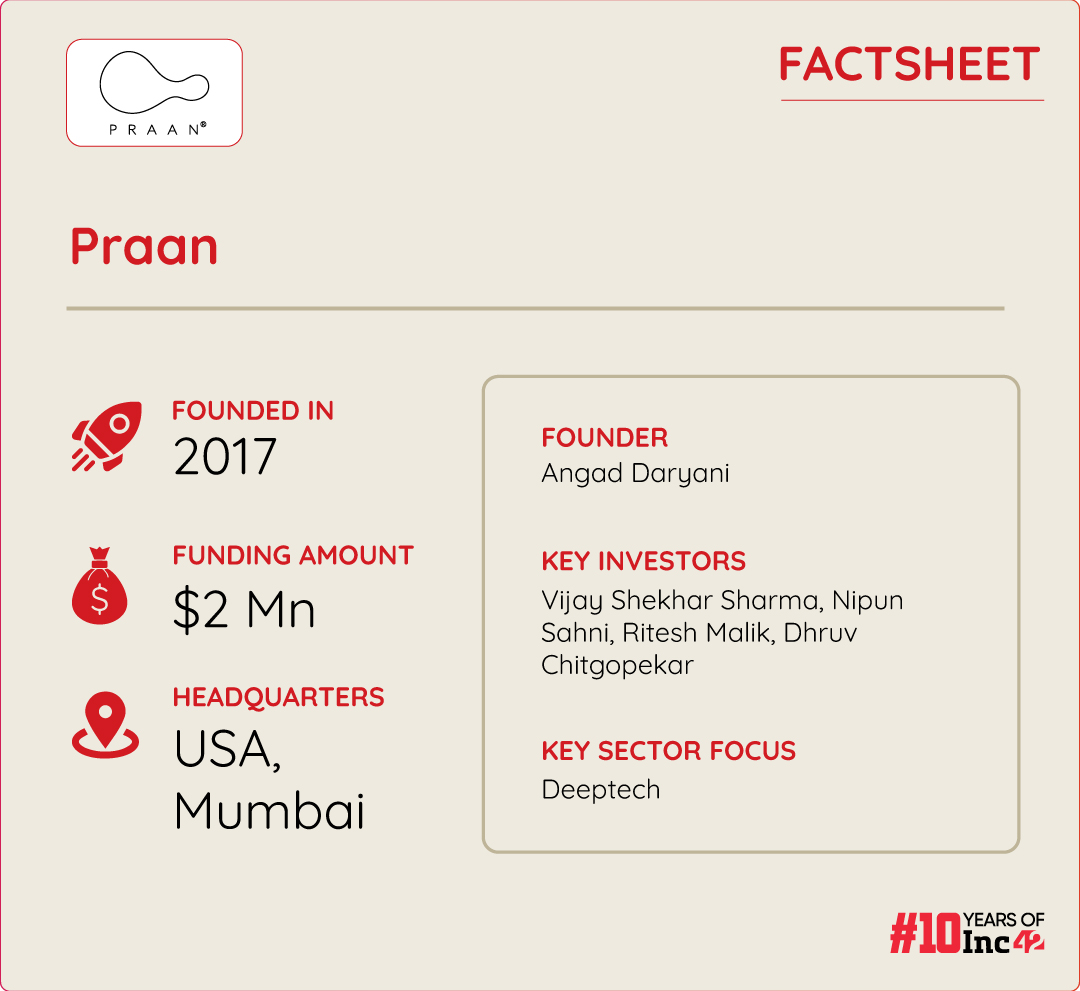Startup Stories
Praan’s Filterless Air Purifiers Are Helping Combat Worsening Air Quality

Today, India stands fifth among the world’s most polluted countries, with PM2.5 levels at 38 µg/m³ (as of February 21, 2024), a staggering 3.7 times more than the WHO recommended limit.
Imperative to mention that particle pollution in and around industrial and factory areas is even worse, and at the wrong end of this equation are the blue-collar employees who earn their living by working at industrial units situated in these areas.
For context, some industries that contribute majorly to India’s air pollution and particulate matter challenges are chemicals, textiles, cement, steel, metal, mining, petroleum refineries, and thermal power plants.
Besides, the country’s MSME space, which comprises 63 Mn enterprises and contributes 30% to India’s GDP, is infamous for wreaking havoc on the environment, leading to the rise in air quality concerns in the country. The situation is grimmer in metropolitan cities like Delhi and Mumbai, which are suffocated around the year due to biofuel and industrial emissions, construction dirt and road dust, among other factors. Stubble burning by farmers is another major contributor that adds to the woes of degrading air quality in the country.
To counter this, while many today use air purifiers at their homes for clean air, there are hardly any options for them once they step outside. The situation is even worse for the industrial workforce, who have no other option but to inhale air laden with all kinds of pollutants.
Addressing this crisis is Angad Daryani’s Praan, a startup that makes air purifiers for industrial use and outdoors. With its Praan MKII (‘Mach 2’), which is a 6.5 ft tall filterless industrial air purifier, the startup aims to establish safe breathing zones in polluted cities.
The Genesis Of Praan
Daryani founded Praan in 2017 while pursuing electrical engineering at the Georgia Institute of Technology in the US. In his second year, Daryani started working on solutions to resolve the issue of urban air pollution.
Having grown up with asthma, this was a real-world challenge he could relate to the most — increasing cases of asthma among kids and adults due to worsening air quality. Therefore, he made it his mission to provide toxic-free air to all, a challenge that many governments across the globe are finding arduous to accomplish.

However, for Daryani, too, the road to MKII has been long and taxing, to say the least. The first-ever filterless air-purification prototype that came from Daryani’s garage was developed from basic over-the-shelf items like a paint bucket, a hose, lots of duct tape and, of course, a powerful suction motor.
The prototype soon took the shape of a 5-ft-tall metal structure, which he would carry to his college almost daily.
A few months later, he returned to India but continued to work on his project, completely bootstrapped. Concurrently, he was posting the progress of his project on the internet.
At the time, deeptech was a very new concept, so hardly anyone dared to take the risk of wading into uncharted waters. However, once Daryani went back to his college, he saw 30 volunteers join his cause. As the project made strides, it got its name Praan, its first logo, and an influx of as many as 30 more individuals joining the team.
Next on the list was perfecting the prototype, and as luck would have it, Naresh Shahani (managing director at BMGI) gave an unsecured loan of $15K to fund the R&D at Praan. Shahani is one of the directors at Praan.
With enough research and funds in place, Daryani built an outdoor air purifier and named it MK One. This was the first-ever working device to have been put together by Daryani and his team. As the research was in full swing, the Covid-19 pandemic hit the world, and the project came to a screeching halt.
The Pandemic Pains
In January 2020, Angad got an opportunity to connect with the cofounder of Collective Artists Network Dhruv Chitgopekar, also Praan’s angel investor, who facilitated Daryani’s introduction to numerous Indian VCs. Despite these efforts, none of them expressed confidence in Daryani’s idea.
Nevertheless, he persevered and secured soft commitments totalling $1.35 Mn from an Indian VC fund and several strategic angels, albeit under unfavourable investment terms.
Then, the pandemic struck the world, and the deal fell apart. Daryani, too, had to fly back to India.
Not losing hope, he continued to work towards his vision and joined hands with many who could relate to his vision of creating a sustainable and clean future.
Without any capital, Daryani managed to onboard people who could work with him online and enhance the tech, software and design of the product.
Today, Praan is backed by venture capitalists such as Social Impact Capital, Aera VC, Better Capital, Avaana Capital, Paradigm Shift Capital, and angel investors like Paytm’s Vijay Shekhar Sharma, Apollo Global Management’s Nipun Sahni, and Innov8’s Ritesh Malik, among others.
What impressed these investors was Daryani’s simple idea that to purify large volumes of air in cities or factories, air purifiers should be filterless. This would bring down the cost of ownership of these purifiers to near zero, marking a significant shift in the industry.
Speaking with Inc42, Daryani said that the choice to start in India was driven by the country’s unique position in the climate scenario.
Also, India’s cost advantages, with low infrastructure and labour costs, make it a crucial hub for climate-focussed companies.
“Starting in India allows direct supply chain oversight, access to raw materials, transparent pricing, and reduced manufacturing costs. Such control is often unavailable or exorbitantly priced in the West. India enables Praan to offer end-to-end climate solutions at a fraction of the global cost while ensuring integrity in the supply chain process,” he added.
Praan’s technology uses fans to pull in polluted air, charge the particles, and temporarily trap them in a charged cylinder. When the cylinder is full, it automatically releases the particles into a collection pocket. This process, without physical filters, relies on electric fields to move and separate particles in real time.
In the country’s cleantech space, Praan competes with the likes of Clairco, Urban Air Laboratory, AirPuro, AirOk, Devic Earth, and Pi Green Innovations, among others.
To address global air pollution, Praan offers the MKI and MKII models for large spaces, employing advanced air purification technologies designed with Ansys Fluent computational fluid dynamics. These systems capture polluted air, separate particulate matter into a collection chamber, and release cleaner air.
Launched in April 2023, Praan’s MKII surpasses its predecessor, MKI from 2021, with 8X the filtration capacity and 10X the speed. Originally designed as a 20 ft outdoor air purification system, the current MKII model stands at 6.5 ft tall.
“The initial 20ft size device was intended to be an outdoor air purification system for public spaces. However, we renewed our focus when we found that particulate density decreases in outdoor air as we go higher in altitude. Therefore, it was natural for us to build devices which remove pollution at the breathing level.”
With a purification rate of 1,300 cubic feet per minute, MKII can be used for spaces like factories, airports, shopping malls, hospitals, and public areas, offering efficient and impactful coverage when deployed in clusters.
Highlighting the urgency of addressing climate impact and air pollution in large industries, Daryani said that MKII addresses the critical issue of fugitive emissions. These emissions involve excessive fine dust accumulating throughout industrial processes, leading to pollution concentrations as high as 40,000 microgrammes within factories. By reducing this by 60%, the MKII significantly improves the working conditions for factory workers, making a substantial impact on air quality.
Additionally, the startup launched HIVE, a compact, high-volume air purification device constructed with aircraft-grade aluminium, in 2023.
The Road Ahead
Recently, there has been a surge of VC interest in the climate tech space. However, the challenge lies in identifying areas within climate tech that offer scalable business opportunities. It is due to this challenge that Indian investors have shied away from making notable strides in the space as compared to their global counterparts.
Nevertheless, the startup has raised around $2 Mn since 2021. It is planning to raise ($14.4 Mn) INR 120 Cr in a Series A round soon.
“In the pre-series stage, we focussed on proving our concept. We learned how to manufacture in India, set up our production line, and gained notable clients to validate market demand. Now, with Series A, our goal is aggressive scaling. Moving from R&D to commercial scaling, we aim to achieve a thousand installations this year for our MKII and Hive products,” Daryani told Inc42.
Praan is working in the Indian Air Purifier Market, which is projected to surpass $1.16 Bn by 2030, growing at a CAGR of 28.51% between 2023 and 2030.
With Indian startups committed to fighting air pollution, the journey of companies like Praan showcases the potential of scalable, local innovations in the country’s larger cleantech space.
Startup Stories
Byju’s partially pays March salaries, pending February payouts.

Byju’s, a prominent player in the edtech industry, has encountered financial challenges resulting in delayed salary payments for its employees. As of April 20, the company has only disbursed a portion of March salaries, attributing the delay to a severe cash crunch. Despite earlier assurances from the company’s management that salaries for March would be paid by April 18, many mid-senior employees have reported receiving only 50% of their March salaries. Additionally, February salaries remain unpaid for a significant number of employees, further exacerbating the situation.
Founder and CEO, Byju Raveendran, has resorted to raising personal debt against his stakes in the company to facilitate salary payments. This underscores the severity of the financial challenges facing Byju’s and highlights the lengths to which Raveendran is willing to go to address the issue.
Employee testimonies reveal the extent of the salary delays, with one employee stating that they received only 50% of their March salary on April 20, with 80% of their February salary still pending. Another concerning aspect is the reported disparity between junior and senior employees, with junior staff receiving full salary payments while top management has gone without salaries for the past two months.
Byju’s has acknowledged the delay in salary payments but has not provided a detailed explanation for the situation. A company spokesperson declined to comment on queries from ET regarding the matter. In an email sent to employees on April 8, the management team expressed regret over the delay and attributed it to the inability to secure approval to access funds from a rights issue. The delay has been further compounded by actions from foreign investors, hindering the company’s access to necessary funds.
This revelation follows a previous report by ET on April 1, which highlighted Byju’s decision to delay salary payments due to constraints imposed by warring investors, limiting the company’s access to funds through a rights issue. The ongoing dispute with investors, including Dutch investor Prosus, has added to Byju’s financial woes and has led to further delays in resolving the issue.
In a separate development, Byju’s India chief executive, Arjun Mohan, announced his departure from the company in mid-April, just six months after assuming the role. This unexpected move prompted founder Byju Raveendran to take on the responsibility of overseeing day-to-day operations of the company’s India business, housed under Think & Learn, marking a significant shift in leadership.
Amidst these challenges, Byju’s is embroiled in a legal battle with a group of investors led by Prosus, who are seeking to block a rights issue and the removal of Byju Raveendran as CEO. The company has also initiated arbitration proceedings to address the dispute and find a resolution.
The rights issue undertaken by Byju’s is significant, as it is being offered at a staggering 99% discount to the company’s peak valuation of $22 billion. This steep discount has implications for investors who choose not to participate in the funding, potentially resulting in a significant dilution of their shareholding post-completion of the rights issue.
The unfolding events at Byju’s underscore the challenges facing the edtech giant as it navigates financial constraints, leadership transitions, and legal disputes. The company’s ability to address these issues effectively will determine its future trajectory and its ability to maintain its position in the competitive edtech landscape.
Startup Stories
Revolut India receives provisional approval for PPI license from RBI

Revolut India, a neobank backed by Tiger Global and Softbank, has secured an in-principle approval from the Reserve Bank of India (RBI) for issuing Prepaid Payment Instruments (PPI), encompassing prepaid cards and wallets. CEO Paroma Chatterjee shared this development in a LinkedIn post on Friday. This approval complements Revolut India’s existing licenses from the RBI, which allow it to function as a Category-II Authorised Money Exchange Dealer (AD II), enabling the issuance of multi-currency forex cards and cross-border remittance services.
Chatterjee emphasized the significance of this milestone, highlighting the opportunity it presents to provide Indian consumers with both international and domestic payment solutions on a unified platform. Revolut, Europe’s largest neobank, entered the Indian market in 2021 with aspirations to disrupt the domestic payments sector. The RBI’s approval is expected to bolster Revolut’s position as a key player in this domain.
Prepaid Payment Instruments (PPIs) are payment tools that utilize stored monetary value, including digital wallets, smart cards, or vouchers, for transactions. RBI Governor Shaktikanta Das proposed on April 5, 2024, to allow PPIs to be linked through third-party UPI applications, enabling PPI holders to conduct UPI payments akin to bank account holders.
Chatterjee underscored Revolut’s commitment to full compliance with regulatory requirements, particularly in India, where the neobank has undertaken significant efforts to localize its global tech-stack to adhere to local regulations.
In an interview with ET BFSI, Chatterjee disclosed Revolut’s plans to introduce a comprehensive suite of digital-first money management services for all Indian customers. These services will enable users to manage their finances, including payments and remittances, both domestically and internationally.
The app, currently in use by employees, will be officially launched once the internal testing phase is completed, according to Chatterjee. She also revealed that there are over 175,000 prospective customers on Revolut India’s waitlist, indicating strong interest in the product.
Startup Stories
Postman buys Orbit to extend developer community reach.

Postman, renowned as an API management platform tailored for enterprises, has recently made headlines with its acquisition of Orbit, a pivotal tool in the arsenal of developer companies for nurturing communities across a spectrum of platforms, including Discord, Slack, and GitHub. Although the specifics of the financial transaction remain undisclosed, Postman took to its blog to underline Orbit’s indispensable role in supporting major developer companies in fostering community management and fostering growth over the course of the past four years.
Within the ecosystem of Postman, the integration of Orbit is poised to be transformative, with the Orbit team set to assume a pivotal role in seamlessly embedding community-centric features into the fabric of the Postman Public API Network. This strategic move is aimed at catalyzing dynamic collaboration between content creators and end-users within the network. Postman, boasting a staggering valuation of $5.6 billion, stands as a stalwart in the realm of API collaboration platforms, serving a user base exceeding 30 million developers and 500,000 organizations.
Under the stewardship of Noah Schwartz, a recent addition to the Postman team hailing from Amazon Web Services, the Orbit team is primed to spearhead initiatives aimed at empowering API distributors to broaden the horizons of their communities, optimize API utilization, and solicit direct feedback from users entrenched within the network.
This integration is anticipated to embolden developers to unearth APIs tailored to their unique requirements and foster meaningful engagements with peers to extract maximum value from each API. However, as part of the transitionary phase, Orbit has outlined plans to gradually phase out its existing product and platform over the span of the next 90 days. Commencing July 11, all functionalities will be deactivated, with no provision for the creation of new users or workspaces.
Postman’s strategic maneuver comes on the heels of its triumphant fundraising endeavor in 2021, securing a whopping $225 million in funding. The fundraising round, spearheaded by Insight Partners, witnessed active participation from prominent entities such as Coatue, Bond Capital (helmed by Mary Meeker), and Battery Ventures.
-

 Startup Stories1 year ago
Startup Stories1 year agoWhy Millennials, GenZs Are Riding The Investment Tech Wave In India
-

 Startup Stories1 year ago
Startup Stories1 year agoStartups That Caught Our Eyes In September 2023
-

 Startup Stories1 year ago
Startup Stories1 year agoHow Raaho Is Using Tech To Transform India’s Fragmented Commercial Trucking
-

 Startup Stories1 year ago
Startup Stories1 year agoMeet The 10 Indian Startup Gems In The Indian Jewellery Industry’s Crown
-

 Crptocurrency9 months ago
Crptocurrency9 months agoLither is Making Crypto Safe, Fun, and Profitable for Everyone!
-

 Startup Stories1 year ago
Startup Stories1 year agoHow Volt Money Is Unlocking The Value Of Mutual Funds With Secured Lending
-

 E-commerce1 year ago
E-commerce1 year agoTop Online Couponing Trends To Watch Out For In 2016
-

 Startup Stories1 year ago
Startup Stories1 year agoWhy Moscow-Based Kladana Considers Indian SME Sector As The Next Big Market For Cloud Computing




